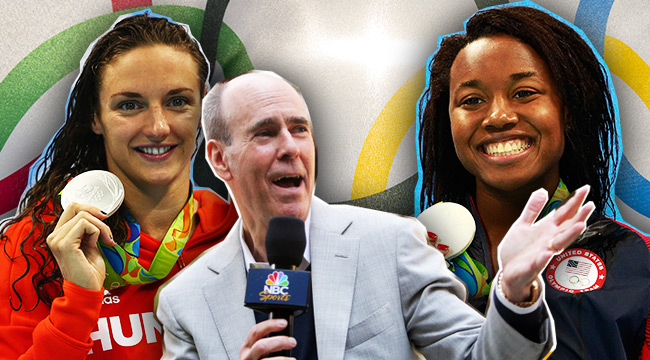
If NBC’s worst problem during the Rio Olympics was that most people can’t watch major events live or see teams besides the USA compete in primetime, that’d be inexplicable enough. But the dearth in quality of NBC’s coverage goes far deeper than that.
Instead NBC’s issues have worsened from simply not knowing how to air the games to what some see as an incredibly sexist and patronizing year of coverage, a problem mirrored by some print and foreign outlets as well. Each day of Olympic coverage has turned into a galling and distracting mess of objectification and marginalization of the female athletes competing.
We should be far beyond the point when networks and publications can feign ignorance about what is or isn’t considered sexist, so why have a number of respected broadcasters and outlets seemingly thrown caution to the wind during these Olympics and gone whole hog on objectifying some of the most accomplished athletes on Earth?
A non-comprehensive list of inexcusable, mostly sexist, things NBC alone has said or done include: commentators crediting the turnaround of Hungarian swimming champion Katinka Hosszu’s career entirely to her husband/coach directly after a gold medal win, saying that Simone Biles’ adoptive parents (her biological grandparents) aren’t her parents because she was adopted (an assertion that commentator then doubled down on later in the day), cutting into a live field hockey game as a scoring chance was forming (take a second to imagine they did that when Kevin Durant was about to take a shot), analysts openly admitting that they didn’t do research on sports they were covering, and commenting on their bodies instead of their considerable athletic abilities.
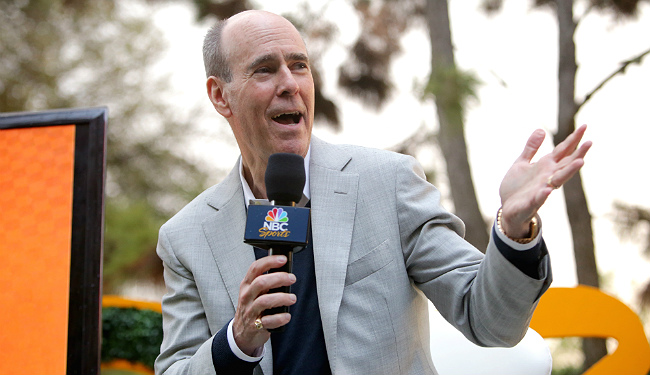
The first and most egregious instance of NBC specifically discrediting so many of their athletes and audience members are the comments that circulated during the opening ceremonies by NBC CMO John Miller. He stated that many Olympic events are on tape-delay because “the people who watch the Olympics are not particularly sports fans. More women watch the games than men, and for the women, they’re less interested in the journey. It’s sort of like the ultimate reality show and miniseries wrapped into one.”
There are many incorrect levels to that assertion, but it’s safe to say it insulted a large majority of sports fans. The larger problem is it’s not only an insulting statement – it’s an incorrect one as well. The amount of people who watch sports and don’t care at all about the result is negligible. It’s this same logic that says women only watch football to impress their boyfriends.
A narrative can be connected to a result, but the fact NBC assumes the audience’s only concern is for the sparkly outfits and the sob story packages put front and center is way off the mark. When a network thinks so little of their audience in this way, the ensuing coverage they provide will only end up lacking.
No matter which example you pull to illustrate the disservice that NBC’s coverage has been to the women competing in Rio right now, it’s clear that the coverage of nearly one half of the athletes is deficient compared to the other half. Women make up 45 percent of the total athletes competing in Brazil (the highest percentage in history) and yet still they are given short shrift compared to men at the games.
Kerri Walsh-Jennings and Dana Vollmer have been highlighted for their abilities to have children and return to volleyball and swimming, respectively. ABC News touted Vollmer’s impressive performance in the pool thus far with the headline “New Mom Dana Vollmer Wins Silver And Bronze, Sets Sights On Gold In Rio,” as if her full name was ‘New Mom Dana Vollmer.’ Why has Michael Phelps not been pigeonholed into the role of a new father? Any physical challenges aside, Phelps’ experiences may not be so different than that of these women when it comes to balancing long days of training with new parental responsibilities and supporting an additional family member. But we’ll never know since we have been treated to a rehabilitation and redemption arc that fails to focus on some of the monumental changes in Phelps’ life since the last time he’s been on the Olympic stage.
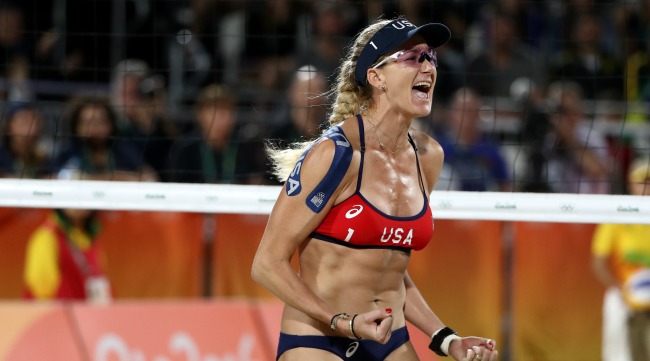
U.S. swimmer Anthony Ervin is being applauded for rebooting his career at age 35 after eight years away from the sport, part of which he spent helping teach swimming in inner cities. Which is a great story and absolutely worthy of being highlighted. So when Michelle Carter won the first gold medal for America in women’s shot put on Friday, it was even more disappointing that NBC immediately tied her story directly to her father Michael Carter, who has a silver medal in shot put from the 1984 Olympics and won a Super Bowl with the 49ers. Nary a mention of the fact that Michelle is a full-time professional makeup artist (an easy hook), or that she has her own organization called You Throw Girl that works to build confidence in young athletes.
It’s not only NBC that is serving these athletes so poorly, as coverage from other countries and platforms has similarly come up short. By and large, print coverage has been more up to the challenge (because apparently it is a challenge) of treating male and female athletes the same, yet some outlets are finding it difficult to separate their inherent sexism from their responsibility to report reasonably on the most important moments of many of these athlete’s lives.
The Chicago Tribune referred to trap shooting bronze medalist Corey Cogdell not by name, but by the fact that she is the wife of a Bears lineman. Many pointed out that the Tribune was most likely making an attempt to localize the story and it’s clear that attempt failed spectacularly. A few more contemplative minutes and its newsrooms could easily think of a different hook that would similarly engage their audiences, yet the instinct is to fall back on the easy choice more often than not, a choice that becomes even more insulting when contrasted with how little it happens in the case of male athletes.
Even Katie Ledecky – magical pool unicorn who has never lost a major race in her life Katie Ledecky – has been reduced to an anecdote in which she “breaks male swimmers” by constantly beating them during training sessions. Not even the best female swimmer in the world right now can avoid the New York Times framing her accomplishments as a man’s “latest project.”
Presented without comment. https://t.co/K2qf7UNYOh HT @deborahblum pic.twitter.com/ECoFHGsLRR
— Maria Konnikova (@mkonnikova) August 15, 2016
Are there really no more facets of Katie Ledecky left to explore that the paper of record is already resorting to stories about her coach rather than her own story? Penny Oleksiak, the Canadian phenom who tied America’s Simone Manuel for a gold medal in swimming, has fortunately been able to break out of her identifier of “NHL player Jamie Oleksiak’s brother” by virtue of her performance. These details should be footnotes in an article or highlight from the start, not the shorthand used to prove why athletes should be given the spotlight in the first place.
Some racist moments from the games have only compounded the sexism on display. Simone Manuel was referred to as “the African-American” in a Mercury News tweet and was then acknowledged by SportsCenter’s Twitter account only for them to use a picture of another swimmer in the post. Gabby Douglas has been bullied for not putting her hand over her heart during the anthem (not a requirement, by the way), yet Michael Phelps cracked up during one of his medal ceremonies because of a Baltimore tradition and received no blowback for being “unpatriotic.” Would either of these young women been treated this way if they were men, especially white men?
https://twitter.com/GrapeSodaPapi/status/763975991215607808
Many of these incidents can be tied back to Miller’s comments about narratives mattering more than results. Once you publicly set that kind of misguided mission statement it becomes even easier to follow it blindly. Even assuming there is some basis to NBC’s opinion about their female audience – which there is not – then that almost presents a larger issue for the network to deal with. If they actually thought this, shouldn’t their coverage of storylines be better?
Instead, the narratives that NBC thinks its viewers care so much about are communicated exceedingly poorly. If the premise is that audiences want to watch something like a “miniseries,” then give viewers drama and nuance, not the umpteenth reminder that America gymnasts have missed sleepovers and proms en route to accomplishing their dreams. Instead of talking about what the Final Five missed out on with intensive training, discuss the interesting side of an athlete’s development and regimen. This focus looks all the worse when the Wall Street Journal proves it can produce a brief video on what makes Aly Raisman’s opening floor routine tumble so impressive that puts NBC’s multiple nights of coverage to shame.
The entire Ukrainian men’s gymnastics team essentially quit the all-around competition after they realized they weren’t going to make the podium in order to save their health for the event finals. Is that not an interesting story arc not tied directly to a result? At one point, the only time the broadcast touched on a Russian female gymnast was to show the moment she fell off a balance beam. What does her fall mean for the standings besides “not good,” and was the skill she was attempting more difficult or less difficult than what other athletes included in their routines?
If NBC truly thinks all of the women watching their coverage are vapid to the point of wanting daytime soap plots and absolutely nothing else from the Olympics, then how much more cliché could it get than hot male gymnasts suddenly and dramatically giving up or Russians fighting through catastrophic mistakes to try and bring home a medal?
If NBC’s Miller is right about his audience and what they care about, then this is an awfully strange way of showing it.

All of these contradictions lay bare the truth of the matter: NBC simply doesn’t care about the quality of their Olympic coverage, respect the female athletes performing, or respect the female viewers at home. If they only wanted to offer expert and quality coverage of the events and in the process failed to fully appreciate what their core-demographic wants from the broadcast, it would be a ratings-damaging foible ultimately able to be fixed with a different focus the next time around. If the network assumed their viewers want only coverage of each event that focuses on Americans and puff pieces, then they would be making an explicit effort to build up a competently produced promotional package around everyone competing and not just a select few. It’s not as if they don’t have the resources available.
Instead, NBC and other outlets are managing to fail in all measurable ways at once, a far more difficult feat and far worse a result than if the problem was simply poor coverage or sexism, not a disappointing amalgam of both.
And this comes to the crux of the issue: disrespect. This year’s Rio coverage has been so disdainful, condescending, and disrespectful to female athletes that it’s clear no effort has been put forth in the preparation at all. NBC comes prepared with at least one package per swimmer on the men’s roster, yet can barely dig up a few interesting facts to use in the event that Simone Manuel wins a gold medal. Al Michaels compiles more tidbits about a third-string lineman on the Jacksonville Jaguars on a random Sunday night than NBC had facts about a swimmer who they knew would be traveling to Rio months in advance.
Tellingly, NBC aired packages about Manuel after she was already a gold medal winner, but not before. They can put forth the manpower to compile clips for any swimmer on the men’s team that might possibly medal (such as Cody Miller, who races with a birth defect), but not for a medal threat on the women’s team. For comparison’s sake, Cody Miller came away from these Olympics with a bronze medal and doesn’t have a heartwarming backstory any more or less interesting than the achievements that Simone Manuel had while at Stanford. They should be anticipating women’s accomplishments, not reacting to them. It should be the norm, not a refreshing change of pace, when Olympic rower Gevvie Stone is referred to as “a 31-year-old doctor from Boston” and not primarily identified as a mom, sister, or daughter.
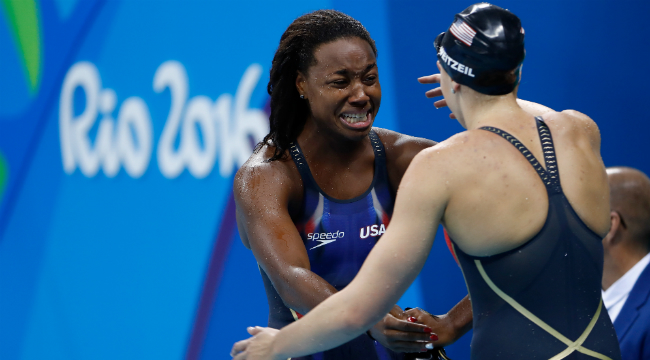
It’s not only happening to individual athletes either; a beach volleyball announcer openly admitted that instead of preparing for a Kerri Walsh-Jennings/April Ross match, he watched two hours of funny Leslie Jones videos. And Al Trautwig feels it is okay to not even learn what an Amanar is, a popular vault that nearly every country competing in Rio includes in their arsenal.
It’s a blatant lack of effort that would be shocking from a small newspaper that devotes a portion of their budget to send a reporter to Rio, but it’s even more maddening when done by a network that has spent millions upon millions of dollars to air and produce their coverage of the games. It’s almost more insulting that NBC has the resources at hand to do better on all accounts and doesn’t feel the need to utilize any of them in favor of many athletes. (But they have no problem putting time and effort into forcing Twitter to quickly and ruthlessly whitewash any clips of coverage that appear.)
While there’s no clear reason why NBC is so patronizing in their coverage of women at the Olympics, there are a few sports that have been treated more fairly by their coverage – namely the U.S. Women’s Soccer Team and the U.S. Women’s Basketball Team. While it hasn’t been perfect, the coverage has been far more informative for each of these teams’ games than the rest of the women’s events. Realistically, this isn’t a coincidence. Both sports are ones that are played often in the United States and as such don’t need a mountain of additional details or insight for the average viewer to understand the games.
Similarly, some of the athletes involved are already famous in their own right (Alex Morgan, Hope Solo, Sue Bird, Diana Taurasi, etc.) and therefore aren’t fresh faces that necessarily have to be explored in extensive packages to get to know them. That doesn’t mean they are completely exempt from condescending questions about their accomplishments – see the umpteenth time a reporter has asked a coach or a member of the basketball team if their dominance is “bad for the sport” or analysis of the soccer team’s loss starting and ending with a discussion of Hope Solo’s ridiculous post-game comments. There are pre-set narratives based on WNBA seasons played or previous World Cups won and lost, and year-round endorsement deals that keep these athletes in the public eye far more than other Olympic athletes. The tough part of NBC’s job is done for them, and they are free to capitalize on an existing audience.
NBC knows people will tune in to the more obscure sports based on the “special event” feel of watching track and field stars or synchronized swimmers perform on national television (that is, if the network decides they actually deserve a slot on national television at all). The sports and athletes can be treated as not deserving of full support and then be left behind until four years later. With this treatment, outlets are essentially saying that by simply acknowledging women’s Olympic events they are doing right by those athletes. In this case the bare minimum is apparently acceptable in the eyes of newspapers and networks at home and abroad. Condescending coverage masquerades as supportive coverage since being given this large a spotlight at all is not the norm for many of these athletes, but people like Simone Biles, Katie Ledecky, and Michelle Carter shouldn’t have to fight just as hard against offensive coverage as they did to get to this level in the first place.
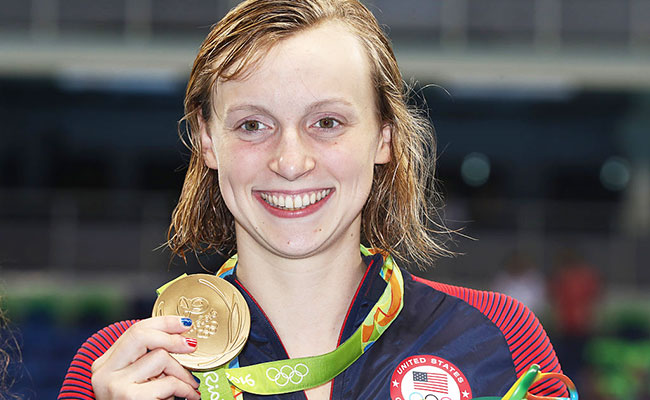
As the LA Times’ Libby Hill said so well on Twitter recently, it’s a privilege to watch female athletes “unapologetically be the best” and “to be proud of their dominance” that they have worked so hard to achieve, a sight that is so much harder to find on television outside of the Olympics and a great example for viewers everywhere no matter which part of the demographic they belong to. That’s why it’s so much more depressing when female athletes are reduced to the sum of their appearance and forced to share their accomplishments with the men in their lives. However, this may also be the reason such sexism persists even when so many viewers constantly call out mistakes such as the ones detailed here.
A consistent ringing of the bell when things like this come up is important to make clear how pervasive and harmful mistakes like these are to female athletes and the audience.
But when so many sports are only aired every four years, there are fewer opportunities to learn lessons from previous coverage. The summer Olympics in 2012 and 2008 were both aired during the social media era and errors by the media are almost always called out publicly. Why then is the amount of sexism not decreasing every four years when those gymnasts step onto the mat or swimmers hit the pool? Could it really be as easy a solution as the fact that as the mistakes die down in between Olympics, so too do the awareness of how such mistakes affect athletes and audiences alike?
If the problem really is so simple to diagnose, then that means the inverse is true of the solution. If the mistakes are simply coming from indifference from people behind the scenes, then that isn’t going to magically go away. There are so many examples of how to properly cover female athletes, the thought that certain people are still in the dark about the proper phrasing and tone for coverage like this means they might not ever learn. Fighting casual apathy with nothing short of a complete overhaul is unlikely, and that can only happen over time as both announcers and executives become more diverse.
If everyone at NBC really believes deep down that the women only want fluff analysis during events, then that old guard attitude still isn’t changing overnight. In that case there’s always the chance that NBC’s ratings for Rio being lower than expected will force them to change their tactics before their executives’ personal opinions can pivot on their own. Nothing initiates a sea change like money at stake.
